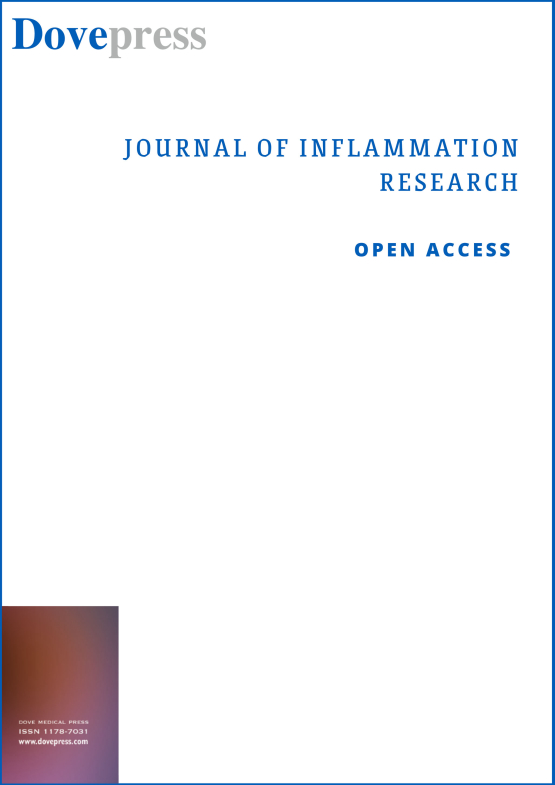Submit a Manuscript to the Journal
Journal of Inflammation Research
For an Article Collection on
Integrating Artificial Intelligence into Inflammation and Cancer Immunology: From Biomarkers Discovery and Mechanistic Insights to Precision Therapeutics
Manuscript deadline


Article collection guest advisor(s)
Dr. Hejer Dhahri ,
George Washington Cancer Center, George Washington University
Dr. Benjamin Powers,
University of Maryland School of Medicine
Integrating Artificial Intelligence into Inflammation and Cancer Immunology: From Biomarkers Discovery and Mechanistic Insights to Precision Therapeutics
The Journal of Inflammation Research, together with Guest Advisors Dr. Hejer Dhahri and Dr. Benjamin Powers, is pleased to invite you to submit your research to the upcoming Article Collection “Integrating Artificial Intelligence into Inflammation and Cancer Immunology: From Biomarkers Discovery and Mechanistic Insights to Precision Therapeutics”.
Inflammation exerts a complex and context-dependent influence on both oncogenesis and the efficacy of cancer therapies. Acute inflammatory responses may enhance anti-tumor immunity; however, chronic inflammation is more commonly implicated in tumor initiation, progression, and the facilitation of immune evasion. Persistent inflammatory signaling contributes to the development of an immunosuppressive tumor microenvironment (TME) by promoting the infiltration of immunoregulatory cell populations, including regulatory T cells, myeloid-derived suppressor cells, and M2-polarized macrophages. This immunosuppressive milieu hinders the therapeutic effectiveness of immune checkpoint inhibitors and adoptive cell therapies such as chimeric antigen receptor T cells. Inflammatory cytokines such as IL-6, IFN-g, and TNF-α also play dual roles, with context-dependent capacities to either promote immune resistance or augment immune activation.
Consequently, the modulation of inflammatory pathways holds promise for the development of patient-specific therapeutic strategies aimed at enhancing responses to anti-cancer treatments. For example, the combination of anti-inflammatory agents with immune checkpoint inhibitors may be particularly beneficial in patients exhibiting elevated baseline levels of inflammation. Among the most promising anti-inflammatory approaches is the use of epigenetic inhibitors, including histone deacetylase (HDAC) inhibitors and DNA methyltransferase (DNMT) inhibitors, which have demonstrated synergistic potential when used in combination with immunotherapies to overcome resistance mechanisms. Importantly, the identification of inflammation-associated biomarkers is essential for effective patient stratification. Such biomarkers would enable the rational design of combinatorial treatment regimens and improve the predictive capacity for therapeutic responses in the context of cancer immunotherapy.
The complex regulatory networks that control inflammation within TME are pivotal to the rational design of combinatorial strategies. Recent advances in artificial intelligence (AI), multi-omics technologies, and computational biology now offer powerful tools for the identification and validation of inflammation-associated biomarkers, as well as for elucidating the epigenetic alterations that drive their activation. These insights can be leveraged to inform the development of targeted therapeutic approaches, thereby facilitating the identification of individuals most likely to benefit from specific immunoepigenetic interventions.
This Article Collection seeks interdisciplinary research that investigate the role and underlying mechanisms of epigenetic alterations in the regulation of inflammation and tumor immunity. We welcome original research articles, reviews, clinical trial studies, and case reports. Submissions are also encouraged that examine the application of AI in predicting therapeutic responses and guiding precision immuno-oncology strategies.
Please submit your manuscript on our website, using the promo code 34582 to indicate that the manuscript is intended for the “Integrating Artificial Intelligence into Inflammation and Cancer Immunology: From Biomarkers Discovery and Mechanistic Insights to Precision Therapeutics” Collection. The deadline for submitting a manuscript is 15 April 2026.
Please contact Ashley Ambros at Ashley.ambros@taylorandfrancis.com with any queries and discount codes regarding this Article Collection.
Keywords: Inflammation and Tumor Immunity; Epigenetic Modulation; Artificial Intelligence in Oncology; Tumor Microenvironment and Metabolism; Diagnostic and Prognostic Biomarkers
Dr. Hejer Dhahri received her Ph.D. in 2024 from the University of Kentucky, with a research focus on cancer epigenetics. Her doctoral work explored the role of histone variants in cancer initiation and progression, as well as the regulatory mechanisms of poly (ADP-ribose) polymerase 1 (PARP1) in transcriptional regulation. A significant portion of her doctoral training was conducted at the Van Andel Research Institute, where she was a visiting student. She is currently a postdoctoral associate at the George Washington University Cancer Center, where her research focuses on the role of histone deacetylase (HDAC) inhibitors in modulating inflammation and improving tumor response to combination therapies involving HDAC inhibition and immunotherapy.
Dr. Benjamin Powers is a surgical oncologist and Assistant Professor in the Department of Surgery at the University of Maryland School of Medicine. He is board-certified in both general surgery and complex general surgical oncology. His clinical focus is gastrointestinal cancers and he is an expert in the treatment of peritoneal cancers. Beyond his clinical practice, Dr. Powers is deeply committed to advancing cancer care through research and interdisciplinary collaboration. His research is funded by the National Science Foundation and focuses on novel treatment approaches for colorectal peritoneal metastasis through the use of photoimmunotherapy. Additionally, he leads multiple initiatives that integrate clinical excellence, innovative research, and the education of future oncology professionals.
Benefits of publishing open access within Taylor & Francis
Global marketing and publicity, ensuring your research reaches the people you want it to.
Article Collections bring together the latest research on hot topics from influential researchers across the globe.
Rigorous peer review for every open access article.
Rapid online publication allowing you to share your work quickly.
Submission Instructions
All manuscripts submitted to this Article Collection will undergo desk assessment and peer-review as part of our standard editorial process. Guest Advisors for this collection will not be involved in peer-reviewing manuscripts unless they are an existing member of the Editorial Board. Please review the journal Aims and Scope and author submission instructions prior to submitting a manuscript.
